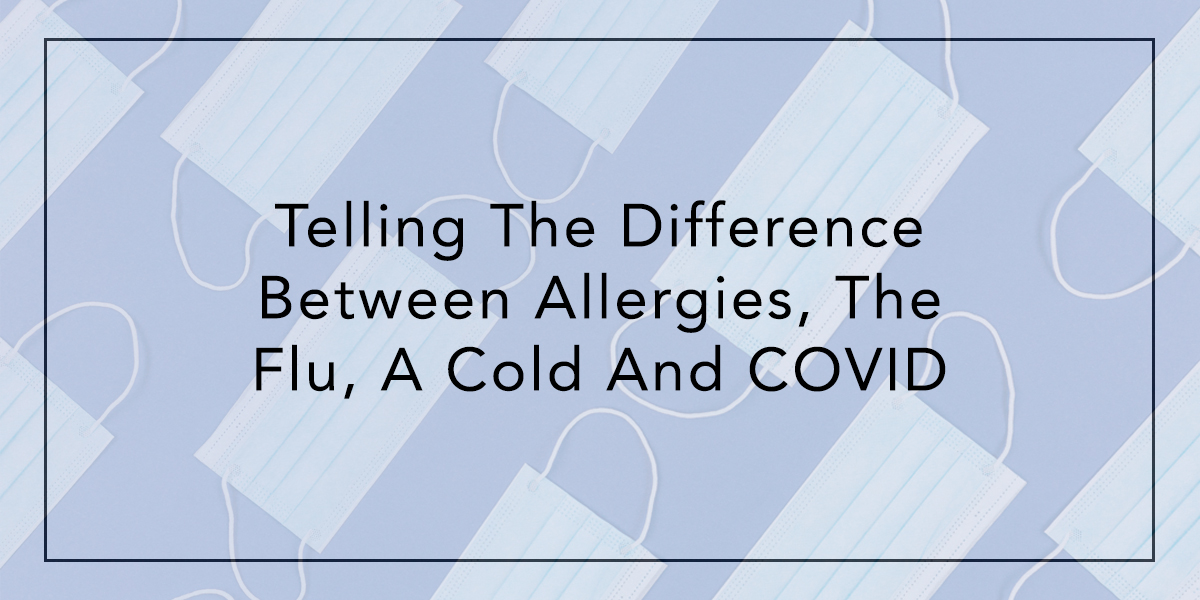Telling The Difference Between Allergies, The Flu, A Cold And COVID

Written by Nutritional Copy Writer Antonia Brogna
Every fall, as the temperature starts to drop, many of us go through the same cycle: am I experiencing a cold, allergies, or even the flu? But this year, with the COVID-19 pandemic, it’s more important than ever to know exactly what your body is experiencing.
COVID-19 can share symptoms with allergies, colds, and the flu, so it is imperative that we’re able to spot the differences. So, how do you tell the difference between them? There’s no foolproof way to do so, but knowing what symptoms are typically associated with each could be helpful.
Allergies and The Common Cold
According to the Center for Disease Control (CDC), seasonal allergies can cause symptoms such as coughing, fatigue, headaches, sore throat, congestion, runny nose, sneezing, and watering or itchy eyes. They also list shortness of breath or difficulty breathing as a possible symptom, but note that seasonal allergies do not usually cause this issue unless there is an underlying respiratory diagnosis such as asthma.
Many people know about their seasonal allergies and what causes them, which might make them easier to identify. Dr. Eric Cioe-Pena, an emergency medicine physician at Northwell Health in New York City, told Today that if a person typically experiences seasonal allergies every year, there’s no need to “go crazy” this year and assume it’s the flu or COVID. However, if you’ve never experienced seasonal allergies before, this is not the year to assume that’s what your symptoms are. At that point, consult your doctor about being tested for allergies, the flu, and/or COVID-19.
Like seasonal allergies, a common cold can also cause a runny or stuffy nose, sore throat, sneezing, and coughing. These symptoms can last for a while, too, sometimes persisting for up to two weeks. The coughs associated with both seasonal allergies and the common cold are typically not chest coughs. Also, both ailments do not commonly cause fevers and if they do, they will typically be low and below 100. If you have a fever, especially a higher one, it’s likely that your body is experiencing the flu or COVID-19.
The Flu and COVID-19
More severe symptoms likely point to either the flu or COVID-19, though experts say it may be difficult to differentiate between them. They are both contagious and cause a lot of the same symptoms, including a fever over 100, shortness of breath or difficulty breathing, coughing, fatigue, headache, and gastrointestinal issues. One symptom associated only with COVID-19 is a new loss of taste or smell, so that would strongly suggest that someone is experiencing COVID and not the flu. However, not every COVID patient develops this symptom.
Since both viruses are contagious, tracing your contact with others may help differentiate between the flu and COVID-19. Otherwise, the best way to know for sure is to be tested.
How to Protect Your Body
Because it can be so difficult to tell the difference between all of the issues facing us this fall, it’s important to take precautionary steps to support our bodies. Aside from social distancing and wearing protective face masks, there are also supplements and nutrients that can help boost your immune system. Some helpful options include:
- Quercetin: This nutrient, often found in citrus fruits, is full of bioflavonoids that help support a healthy seasonal immune response.†
- Vitamin C: Vitamin C is an essential antioxidant that helps protect your heart and lung and also helps boost immune function.†
- Colostrum: This nutrient contains enzymes that can help fight bacteria and support the immune system.†
- Mangosteen extract: This fruit-based extract is full of vitamins, minerals, and antioxidants that help support healthy immune system function, including Vitamin C, Vitamin D, zinc, magnesium, and more.†
Overall, it’s more important than ever to take the proper precautions this season. Be mindful of social distancing regulations and make sure you’re eating foods and taking supplements that can help foster a healthy immune response.
